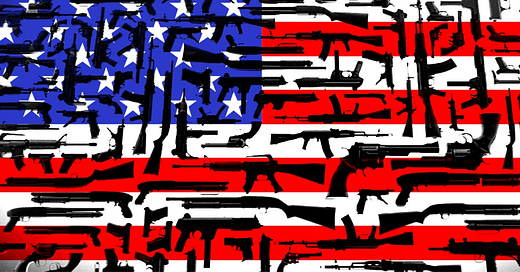The guns or the violence?
Like all chicken-or-the-egg arguments, what matters most is where we go from here.
The intentions of America’s founders and the framers of our constitution still matter. They were animated by profound ideals, however imperfectly implemented, that resonate and provide essential, useful direction today. But when it comes to guns, I no longer care what the founders thought.
I’m tired of debating that comma, the definition of “militia”, and the meaning of “well-regulated”.
I’m tired of the claim that gun ownership is an absolute right.
I’m tired of the posture that reform is impossible.
What I care about is the kind of country and kind of society we want. Is a country with more guns than people with more violence than any similar nation who we want to be? Is an armed citizenry as a bulwark against state-based tyranny important to us? Even if it’s just for show? Is it more important than limiting society’s capacity for harm? Is the capacity to express hard power necessary to our concept of citizenship? The founders had their perspectives about these questions that no longer feel useful.
What do we think now? What should be the relationship between citizenship and hard power be now? What will make our communities whole and safe now? What do we do with the 400 million guns in America now?
The idea that the guns argument ended in America when we collectively decided that killing children was acceptable after Sandy Hook feels terrifyingly prescient and requires us to transform the conversation entirely in order to even consider the possibility of a different future. If, as gun proponents like to point out, most mass killings are perpetrated with legal guns, then what we allow to be legal and the kind of culture that leads to their use and that feeds the kind of rage that gets expressed as either indiscriminate violence or as specific hate crimes must change. If, as gun opponents like to point out, most day-to-day gun violence and suicides occur partially as a function of availability and opportunity, then availability and opportunity must change.
Ultimately, the central question is do we want to be different? If we do, we need to start behaving differently, regulating differently, and embracing a different future. Otherwise, we should stop bothering with the body count because either collectively we don’t care as much about the lives lost than our right to bear arms or collectively we don’t think they are connected. And the second just feels like a justification for the first.
Welcome to 7 Bridges — a conversation about the future of humanity and democracy in America. If you’re joining us for the first time, hello! Subscribe via the button below to get this in your inbox for free.
Please consider becoming a paid subscriber to support this work, too. Subscribing to 7 Bridges is the best way to keep it free and open to all — and to support new voices and independent media.




